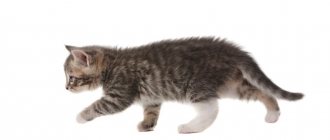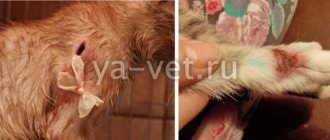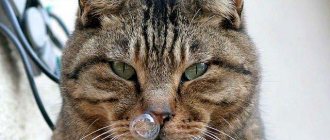Almost all owners of domestic cats periodically encounter such a not very pleasant illness as constipation in cats. Mostly older cats are susceptible to constipation, but this problem does not bypass completely healthy and young cats, and even recently born kittens.
Constipation is absent, difficult or insufficient bowel movement, which leads to a large accumulation of hardened feces in the colon, which gives the pet unpleasant and often painful sensations, and over time can lead to quite sad consequences.
Feces that are not removed in a timely manner poison the body and can lead to general intoxication , increasing the load on the excretory internal organs: stomach, kidneys, liver. Over time, progressive poisoning by decomposition products can disrupt the normal functioning of the heart and thereby lead to death.
Why is constipation dangerous?
Defecation is a natural process through which the intestines are freed from processed substances. If feces are retained and not released for several days, this leads to severe intoxication of the body.
When a cat is constipated, bacteria that live in the large intestine release toxins, and waste bile contains breakdown products of hemoglobin.
If a cat cannot go to the toilet for a long time, and this happens often, this is bad. This means the pet needs help. After all, systematic constipation can lead to intestinal obstruction and internal bleeding.
Causes of constipation in cats
If your cat cannot go to the toilet in a big way, it is important to find out the cause of the problem. Constipation is not a disease, but only a symptom that indicates some kind of disorder in the body.
The main causes of constipation in cats:
- The pet drinks little. Due to lack of moisture, stool hardens and moves poorly through the intestines. This often happens when a cat is suddenly switched to dry food.
- Errors in nutrition. Feeding a cat food from the human table can lead to a lack of vitamins and microelements. Because of this, the functioning of various body systems, including the digestive system, is disrupted.
- Stress. A cat may experience constipation after experiencing a fright, a change of owner or place of residence, and a kitten may experience constipation after separation from its mother.
- Worms. Infection with parasites leads to disruption of intestinal function - stool becomes irregular, constipation alternates with diarrhea. In advanced cases, when there are a lot of helminths inside, they interfere with the movement of feces through the intestines.
- Taking diuretics or iron supplements.
- Low mobility. Elderly, pregnant cats, as well as cats with joint diseases have problems with bowel movements because they move little.
- Hairballs. Constipation often occurs due to obstruction of the intestines, as hair clumps accumulate in the intestines.
- Foreign body. If a cat swallows an object, this can also cause constipation.
- Scars in the rectum or anus.
- Distension of the intestines as a result of prolonged constipation.
- Diseases of the paraanal glands in cats.
- After childbirth and abdominal surgery, there are also stool disorders.
Attention! Older cats are more likely to be constipated. It is associated with weakened intestinal motility. In small kittens, this problem occurs due to imperfections in the digestive system.
Chronic diseases that can cause constipation in a cat
Often, constipation is accompanied by diseases that are associated with disturbances in the functioning of the endocrine system:
- diabetes;
- tumors in the rectum or anus;
- kidney pathologies;
- congenital anomalies of the gastrointestinal tract.
Spinal injuries, which damage the nerve roots of the spinal cord, lead to loss of sensation, and the cat cannot poop.
Treatment of constipation
Treatment for constipation in a cat depends on the causes of constipation. The main goal of therapy is to soften stool and remove it from the intestines.
If this is an isolated case, and it happened for the first time, then medications are not prescribed. If cases of defecation retention are frequent, the following methods are used:
- Water enema at the rate of 5-10 ml of water per 1 kg of animal weight. Enema with physiological saline solution with the same calculation of proportions. Enema with Vaseline oil for a cat. You can do an enema with Duphalac.
- Abdominal massage.
- Taking oral laxatives for cats.
- Medicines that promote the movement of feces through the colon (Bisacodyl suppositories or glycerin suppositories for children). Suppositories are used alone or together with oral laxatives.
- Increased physical activity.
- Changing the feeding diet: introducing coarse wheat bran and canned pumpkin into the feed.
- Switching to food for cats with digestive disorders. Many brands have such lines, for example, Hill's ID, Royal Canin Fiber Response, etc.
Mild degree
When constipation occurs for the first time, a diet with a high fiber content (psyllium bran, wheat, cereals) is prescribed. Bran is added to the food - 1-2 tablespoons per serving of food.
Before introducing fiber into the diet, give the cat plenty of water to enhance the effect and prevent the accumulation of fiber in the intestines. Typically, most cats benefit from dietary fiber to help cope with the problem.
If constipation occurs again in a cat, Vaseline oil (pure or mixed with milk) or a laxative based on cisapride is recommended: Peristil, Coordinax - 0.1-0.5 mg per 1 kg of body weight.
Average degree
In case of frequent relapses, it is recommended to treat constipation with lactulose-based laxatives: Duphalac, Portalac, Goodluck and increase the fiber content in the diet. The cat is given a laxative every 8 hours at a rate of 0.5 ml per 1 kg of its body weight. The substances in the composition increase the secretion of fluid in the intestines, which facilitates the passage of feces.
If the problem persists, the laxative Bisacodyl and prokinetic drugs Ranitidine or Nizatidine, which stimulate the motility of the digestive organs, are additionally prescribed. However, Bisacodyl should not be used daily. Long-term use of the drug is detrimental to the nerve cells of the intestinal lining.
In difficult cases, hard feces are removed using enemas. Sometimes, if the feces are very dry, the veterinarian will perform a manual bowel cleanse. The cat is given plenty of fluids and anesthetized using an endotracheal tube. Then a saline solution or warm water is introduced into the intestines and the hardened stool is manually kneaded.
If a cat has constipation accompanied by flatulence, then the gases are removed through a probe and then the cat is given Vaseline oil. Pain syndrome is eliminated by Spasmalgon or No-shpa.
If drug treatment does not help, surgery is performed to remove part of the colon.
Associated symptoms
Constipation does not necessarily mean a complete absence of bowel movements. Some cats have regular bowel movements, but very little feces come out. For this reason, the animal owner may not even be aware of the problem. It is important to find out in time that the cat has stool retention, before his condition worsens.
To understand that your pet needs help, you need to study the symptoms of constipation in a cat:
- the cat does not walk much for 48 hours;
- on palpation, the abdomen is enlarged and painful;
- the cat becomes restless and loses its appetite;
- the pet spends a lot of time in the tray, unsuccessfully trying to poop;
- the cat strains and meows pitifully;
- if the pet still manages to pass a large stool, then very little feces are excreted, it is dry and covered with cracks;
- there is blood in the cat's feces;
- the anus is hyperemic.
Attention! If a cat doesn't poop for more than 4-5 days, it's very bad. With prolonged constipation, signs of intoxication appear - lethargy, vomiting, and sometimes the temperature rises.
Products for internal use
The question of what to do if a kitten is constipated arises even for the most caring owners. You can try to provide first aid with Vaseline oil. Self-treatment is carried out if there is no suspicion of intestinal blockage (bloating, pain).
A drug with laxative properties should be given by pouring 3-5 ml of oil into the cat’s mouth every 3-4 hours. You can repeat the procedure no more than 2-3 times. The product acts quickly, enhancing peristalsis and slightly softening too dry stool. If it does not work, then the animal needs to be shown to a veterinarian. You cannot replace the drug with vegetable oil.
Without a doctor's prescription, you can give your pet the pharmaceutical drug Duphalac. You need to drink it at a dose of 0.5 ml per 1 kg of cat weight. You can use the medicine 1-2 times a day, for no more than 2 days. If it does not work, consult a doctor.
It is not advisable to use enemas or place suppositories on your own. If the manipulations are performed incorrectly, there is a risk of harming the cat more than helping.
What to do at home if your cat is constipated
In most cases, it is possible to improve bowel movements with the help of nutritional correction, increased physical activity, massage and laxatives. If fecal retention in a cat is caused by intestinal pathologies or tumor processes, then only surgery will help.
In cases where prolonged constipation is accompanied by vomiting, the cat is given IV drips to prevent dehydration.
Normalization of diet
To help your cat with constipation, you need to change his diet. In the first days after symptoms are detected, it is advisable to switch your pet to liquid food. Food from the human table is completely excluded from the menu - semi-finished products, sweets, foods with added salt and spices, bones.
To loosen stools, you can give a little beef liver daily.
What to include in the diet of a cat with constipation:
- vegetables – pumpkin, spinach, carrots;
- fermented milk products - classic yogurt without additives, kefir, yogurt;
- vegetable oil – no more than 1 teaspoon per day.
It is very important to increase the amount of fluid consumed. The cat should be given purified raw water.
Veterinarians recommend placing several bowls of water in different places in the apartment.
Special feed
Cats that are accustomed to dry industrial formulas are given special food with fiber, vitamins and minerals. They contain plant components, fish oil, and cereals. List of medicinal foods for cats for constipation:
- Royal Canin Fiber Response. Recommended for the treatment and prevention of diseases of the gastrointestinal tract. Duration of use for acute constipation is 1 month, for chronic constipation – up to six months.
- Hills Prescription Diet Feline w/d. Recommended for cats with diabetes, colitis and constipation. Contains a large amount of coarse fibers, which help enhance intestinal motility.
- Eukanuba Renal. Dietary cat food for constipation due to kidney dysfunction. Its difference from others is its low protein and phosphorus content.
Attention! It is very important to feed your cat as recommended by the manufacturer. Do not increase the dosage indicated on the package and do not pour food more than twice a day.
Massage and Vaseline oil
If constipation occurs, you can massage your cat's abdomen and give him Vaseline oil. It is not absorbed in the intestines, but moves along it all the way to the rectum, lubricating its walls and softening the stool.
Vaseline oil helps quite quickly: after 3-4 hours the cat goes to the toilet. The method of application is simple - you need to let the cat drink 1-2 ml from a syringe without a needle. It is advisable to do this in the morning on an empty stomach, then the oil will easily enter the rectum.
Massage helps strengthen intestinal motility. It is done 2-3 times a day for 5 minutes. The cat should not eat an hour before the procedure and 2 hours after it.
Massage technique:
- place the cat on its back on your lap;
- massage the abdominal area clockwise with your fingers.
You can help a kitten in the same way. Although it is usually the mother who massages the babies. She licks their bellies several times a day. This helps kittens go to the toilet regularly.
Laxatives
An easy way to treat constipation in a kitten is to start giving a laxative. It is worth giving preference to safe drugs. The following medications are suitable for cats:
- Duphalac Lactusan. A laxative based on lactulose, which not only softens stool well and promotes its movement, but also improves bowel function. Even a kitten can be given this medicine for constipation; it is absolutely safe.
- Microlax. This is a mini-enema with a solution for rectal administration. The composition contains substances that displace bound water from feces. The drug acts quickly - the urge to have a bowel movement occurs from the first minutes after administration of the solution.
- Normaze. Lactulose-based syrup. Effectively softens stool and promotes easy bowel movements.
Attention! Laxatives can only be given to a cat on the recommendation of a veterinarian. In some cases, their use can harm your pet.
What should the owner do?
During the first days after sterilization, your furry pet needs good care and a balanced, healthy diet. Constipation in cats often develops after surgery, so the owner should be on alert. He needs to remember that it is better to prevent any pathological condition in an animal in advance than to treat it later.
Castration (sterilization) of cats is a simple procedure, and the animal tolerates it well when performed by an experienced veterinarian. Surgery usually does not cause adverse consequences.
Veterinarians advise not to feed the cat 12 hours before sterilization so that its intestines are completely emptied. The fact is that after the administration of anesthesia, the activity of all internal organs in a cat slows down, so digestion of food occurs slowly. The pet also recovers gradually from anesthesia; after waking up, it wants to drink and sometimes asks for food. But due to the fact that the gastrointestinal tract does not function at full capacity, problems arise with emptying.
If a cat experiences constipation after sterilization, this is fraught with adverse consequences. The main danger is that with excessive tension, the applied postoperative sutures begin to bleed, and sometimes completely separate. Constipation in cats is a condition in which the animal is unable to have bowel movements for more than 2-3 days. If this problem persists for 7 days or more, the risk of poisoning and the development of intestinal obstruction increases. This problem poses a serious danger to the life of the animal.
Prolonged constipation - megacolon
If the cat does not go to poop on either the third or fourth day and at the same time behaves very restlessly, perhaps he has not just constipation, but megacolon. This is a dangerous condition that can only be diagnosed in a clinic. With prolonged constipation, dry and hard stool accumulates in the intestines.
They cannot move towards the exit and completely block the intestinal lumen.
With prolonged constipation, the cat refuses to eat, looks lethargic, and begins to vomit. If such symptoms are detected, treatment should be started immediately, but first the veterinarian must make sure that it is megacolon. You will have to do an abdominal x-ray or ultrasound.
If the diagnosis is confirmed, surgical intervention will be required, since drug treatment is ineffective.
Preventive actions
Constipation can occur in cats of any age and breed. The animal owner should try to minimize the risk. You just need to follow these recommendations:
- Brush your cat regularly, especially during intense shedding, to prevent him from swallowing his fur;
- ensure that there is always clean water in the drinking bowl;
- Deworm the animal 3-4 times a year;
- play with the cat, because physical activity helps the intestines work better;
- do not give your pet bones;
- remove small objects from the floor so that the cat does not swallow them;
- Provide your cat with adequate nutrition - it is best to feed it with high-quality industrial formulas.
At the first symptoms of stool retention, it is better to seek veterinary help. There is no need to waste time, because the effectiveness of treatment directly depends on whether it is started on time.











